

Making Sense of Data in the Media - Online Course. <p>Unable to play video.
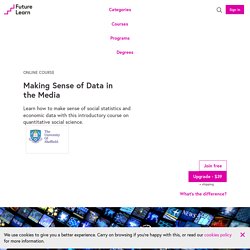
Please enable JavaScript or consider upgrading your browser. </p> Captions Settings Dialog Beginning of dialog window. Escape will cancel and close the window. Librarian in Training: Pin the Activity on the Research Lifecycle. Over the summer I ran the third iteration of the Research Support Ambassador programme at Cambridge.
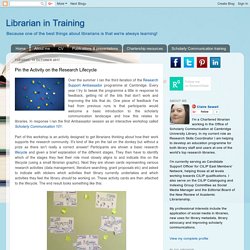
Every year I try to tweak the programme a little in response to feedback, getting rid of the bits that don't work and improving the bits that do. One piece of feedback I've had from previous runs is that participants would welcome a basic introduction to the scholarly communication landscape and how this relates to libraries. In response I ran the first Ambassador session as an interactive workshop called Scholarly Communication 101. Part of this workshop is an activity designed to get librarians thinking about how their work supports the research community. It's kind of like pin the tail on the donkey but without a prize as there isn't really a correct answer! Research skills (University of Westminster) ScHARR Research Hacks - How to maximise the impact and reach of your research.
Dissertation Webpages. The Final Chapter. Welcome to Final Chapter.
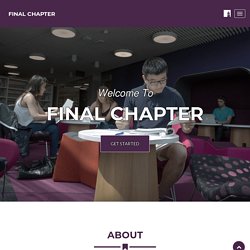
This resource contains useful information for undergraduate and taught postgraduate students working on their research projects. The research project is the culmination of your course, and allows you to focus on an area of interest. This will provide you with research experience and the opportunity to develop your employability skills. Final Chapter can help throughout the process, from starting off and choosing your topic, to researching, structuring your chapters and writing up. In each section you will find advice and guidance that can be incorporated into different types of project, as well as tips from students and academic staff. Note that the specific requirements for projects differ between disciplines; always follow the guidelines you have been given by your school, or consult your supervisor if you are unclear.
When you’ve finished Final Chapter, please give us feedback to help us improve the resource. About this site. About this site Introduction This resource provides support and guidance for personal study and to help you through the dissertation process.
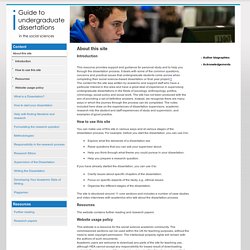
It deals with some of the common questions, concerns and practical issues that undergraduate students come across when completing their social science-based dissertation or final year project.1 The content for the site was written by academic and support staff who have a particular interest in this area and have a great deal of experience in supervising undergraduate dissertations in the fields of sociology, anthropology, politics, criminology, social policy and social work. The site has not been produced with the aim of providing a set of definitive answers. Instead, we recognise there are many ways in which the journey through the process can be completed. Piecing together your dissertation.
Planning and conducting a dissertation research project. This guide addresses the task of planning and conducting a small research project, such as for an undergraduate or masters’ level dissertation.
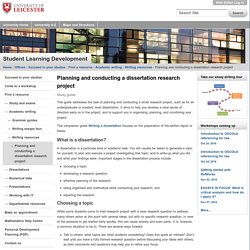
It aims to help you develop a clear sense of direction early on in the project, and to support you in organising, planning, and monitoring your project. The companion guide Writing a dissertation focuses on the preparation of the written report or thesis. Introduction. Many subjects now offer final year students the option of submitting a long essay or dissertation.
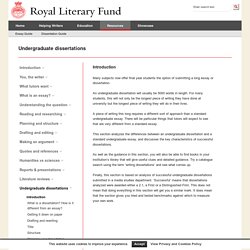
An undergraduate dissertation will usually be 5000 words in length. For many students, this will not only be the longest piece of writing they have done at university but the longest piece of writing they will do in their lives. A piece of writing this long requires a different sort of approach than a standard undergraduate essay. There will be particular things that tutors will expect to see that are very different from a standard essay. This section analyzes the differences between an undergraduate dissertation and a standard undergraduate essay, and discusses the key characteristics of successful dissertations. As well as the guidance in this section, you will also be able to find books in your institution’s library that will give useful clues and detailed guidance. DIssertations. Engage - The interactive research resource for bioscience undergraduates. !
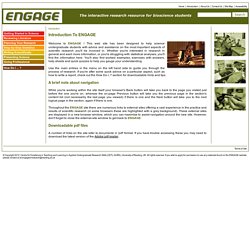
This web site has been designed to help science undergraduate students with advice and assistance on the most important aspects of scientific research you'll be involved in. Whether you're interested in research in general and want more information, or you're struggling with statistical analyses, you'll find the information here. You'll also find worked examples, exercises with answers, help sheets and quick quizzes to help you gauge your understanding. Use the main entries in the menu on the left hand side to guide you through the process of research.
If you're after some quick advice on a particular aspect, such as how to write a report, check out the How Do I..? Doing a Dissertation in Economics – help and guidance - Studying Economics. Planning Your dissertation is likely to be the biggest project you do at University, taking up anything from 8000 to 15000 words.
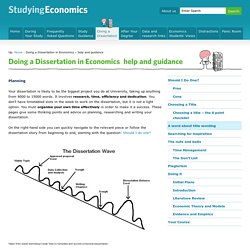
It involves research, time, efficiency and dedication. You don’t have timetabled slots in the week to work on the dissertation, but it is not a light option. Doing Research. Dissertations: the a-z of literature reviews. Planning your dissertation. Choosig your Subject Notes. Ways to come up with a research question: browsing through journal contents.
Anything you were sceptical about. Ways to come up with a research question: Listen to what other are planning. Being Original. Coming up with a research question. In a small number of cases students may not have to think of their own research question as they are fitting within a larger project, but the vast majority of students do have to think of their own research question when it's time to do their dissertation.
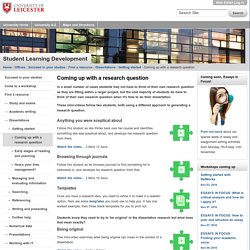
These mini-videos follow two students, both using a different approach to generating a research question. Anything you were sceptical about Follow this student as she thinks back over her course and identifies something she was sceptical about, and develops her research question from there. Watch the video... 3 Mins 12 Secs. Browsing through journals Follow this student as he browses journals to find something he is interested in, and develops his research question from that. Watch the video... 2 Mins 10 Secs.
Templates. Choosing a dissertation topic – citylibresearchers. I have recently completed an MA in Academic Practice degree run by the Learning Enhancement and Development Team at City, University London.
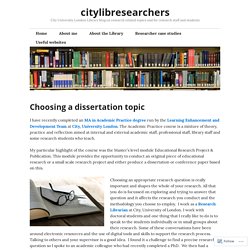
The Academic Practice course is a mixture of theory, practice and reflection aimed at internal and external academic staff, professional staff, library staff and some research students who teach. My particular highlight of the course was the Master’s level module Educational Research Project & Publication.
Choosing your dissertation topic. Reading & Searching Effectively. Setting boundaries around your reading. How To Read a Scholarly Journal Article. Targeted Reading and Use of Evidence - UniRdg_Library's library. Reading and Assessing scholarly journal articles. Reading Scientific Journals. Methodology Introduction. Research Onion Saunders. Understanding Research Methods - University of London & SOAS University of London. Research methodologies.
Introduction. University of Bolton. Primary research methodologies can generally be categorised into quantitative or qualitative techniques, although sometimes a combined approach is used. It is important that you understand the difference between them, the advantages and disadvantages and when they would be appropriate to use. Whichever methods you select, you must justify your choice and explain how this relates to the literature that you have discussed in the literature review. Resources - Methods@Manchester - The University of Manchester. The UK Data service The UK Data Service is a national data service funded by ESRC to provide access and support for an extensive range of data, both quantitative and qualitative. UK Data Service Census Support provides services to allow users in UK higher and further education institutions to access data from the 1971, 1981, 1991 and 2001 UK censuses. Useful Books. Your Student Research Project (click to go to Amazon)
Successful Qualitative Research: A Practical Guide for Beginners (click to go to Amazon) A Student's Guide to Methodology (click to go to Amazon) Review Justifying why this is one of the best books around on methodology is easy when the author's own students provide that evidence. Clough and Nutbrown's 3rd edition provides an important book for undergraduate, masters and doctoral students in education and the wider social sciences. Developing a Questionnaire (click to go to Amazon) A Practical Guide to Research Methods (click to go to Amazon) Research Methods for Business Students (click to go to Amazon) From the Back Cover Research Methods for Business Students has been fully revised for this seventh edition and continues to be the market-leading textbook in its field, guiding hundreds of thousands of student researchers to success in their research methods modules, research proposals, projects and dissertations.
So, if you're thinking . . . 'How do I choose my topic? ' 'I'm confused by all these different philosophies' Research Methodology - Necessary knowledge to conduct a business research. Quantitative Rsearch. Khan Academy. Engage - The interactive research resource for bioscience undergraduates. UK Data Service Discover. Seminar Slides and Audio - Centre for Statistical Methodology.
Centre for Statistical Methodology Seminar Analysis of Clinical Trials Theme 30 June 2017Design and analysis of randomised trials with treatment-related clustering Rebecca Walwyn (University of Leeds)Slides (.pdf, 0.4MB) Slides & audio coming soon Centre for Statistical Methodology Seminar Multivariate Methods Theme 20 June 2017 Correspondence analysis for studying food perception in Europe Prof Eric Beh (University of Newcastle, Australia)Slides & audio (external website) Centre for Statistical Methodology Seminar 26 May 2017Information anchored sensitivity analysis for randomised controlled trials via Multiple Imputation Suzie Cro (Imperial College London)Slides (.pdf, 1.0MB)Slides & audio (external website) UK Data Service » Video tutorials. StatsLife - resources for the general public. StatsLife - resources for the general public. Resources. Qualitative Research.
Resources for those starting out with Qualitative Research Methods » LEAP Researcher Training Hub. Manchester Methods1 is a collection of open access resources. They also run some free workshopsNational Qualitative Data Analysis resources2: free resources for supporting those using SS methods. Methodologies. Exploring Online Research Methods: Online Questionnaires. A Guide to the Design of Questionnaires (University of Leeds) Qualitative Methods. Mba2216 business research week 4 case study 0613. QSR International. 18 April 2016 - BY Lee Fallin Lee Fallin works as a Library Skills Adviser (Learning Developer) at the University of Hull. Critical Analysis. Academic Writing at University. CASP Tools & Checklists. This set of eight critical appraisal tools are designed to be used when reading research, these include tools for Systematic Reviews, Randomised Controlled Trials, Cohort Studies, Case Control Studies, Economic Evaluations, Diagnostic Studies, Qualitative studies and Clinical Prediction Rule.
These are free to download and can be used by anyone under the Creative Commons License. Critical thinking and reflection - a student resource. Showing critical analysis in a report : Skills Hub: University of Sussex. According to tutors who mark reports the discussion of the findings has the most potential for gaining high marks and demonstrating critical analysis.
However, students often loose marks in this area because they don’t: Tips for writing a critical essay. Bradford Uni Teach Yourself Critical Analysis. What is critical writing. For a printer-friendly PDF version of this guide, click here It is common for feedback on student writing to focus on the need to engage more critically with the source material. Typical comments from tutors are: ‘too descriptive’, or ‘not enough critical analysis’. Study Skills: Structuring an Argument. Academic Writiing. Academic Phrasebank. Amazon.co. Linking Ideas and Paragraphs. Structuring Paragraphs Screencast. Structuring your essay - UniRdg_Library's library. Writing Tools. Written? Kitten! The 31 Best Tools for Improving Your Writing Skills. Words are hard. Whether you're a published author or just getting started with blogging, it's not always easy to string words together in a way that makes sense, sounds good, and makes the reader feel something.
But every marketer should be able to write -- and, more importantly, every marketer can write. The workspace for your life’s work. Literature and Latte. Try Scrivener free for 30 days Download Scrivener and try it for yourself. The trial runs for 30 days of actual use: if you use it every day it lasts 30 days; if you use it only two days a week, it lasts fifteen weeks.
Blogs. LSE Government – How do you write a Dissertation? Advice from a graduate. Literature Review HQ - How to write your literature review: Writing, organisation and motivation tips from the experts. Evaluating your practice Archives - Students 4 Best Evidence. To be, or not to be doing a PhD (that is the question?) Ten things I wish I'd known before starting my dissertation. PhD Research. Ten search engines for researchers that go beyond Google. Researcher professional development. Inspiration. Ken Robinson: 10 talks on education.